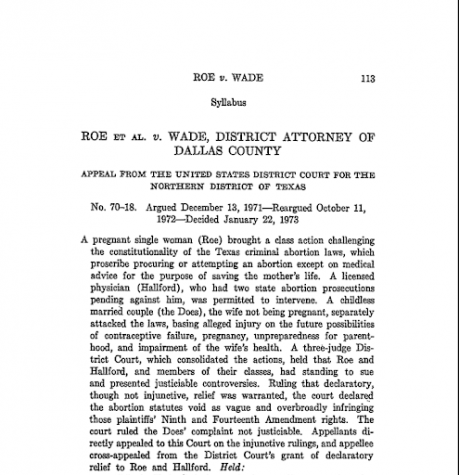Abortion Has Come into Jeopardy Again?

On January 22, 1973, the US Supreme Court decided in a shocking 7-2 decision to officially legalize abortion in the United States, being one of the first countries to do so. This decision allowed abortion up to the end of the second trimester with few restrictions. This gave leeway for states to only prohibit abortion during the third trimester. The court case is widely remembered as Roe v. Wade. The debate over the legality of abortion in this country was finally done. Or so we thought…
The people of the United States have never stopped arguing in regards to the reasonable legality of abortion. Every single person in this country has a different opinion, whether based off of moral, religious, scientific, or many other factors. This can be seen by all the different state regulations displaying the differing opinions of the country.
Here in Colorado, abortion is legal anytime during pregnancy. In Missouri, abortion is legal up to 22 weeks unless the life of the mother is in danger. In Mississippi, a new ban has been placed at 16 weeks into pregnancy, which has now led to another Supreme Court case, already a rare occasion considering the few court cases that lead to the Supreme Court.
The implication of this case can lead to the alteration of not only abortion laws in Mississippi, but it can alter or even eliminate Roe v. Wade all together. This is no guarantee however, as the court has not made a decision on this case just yet. However, there is still the risk.
For the majority of United States history, the Supreme Court has been historically conservative with few decisions that can be considered liberal. Some of the most historic cases has been liberal decisions, such as Brown v. Board of Education (1954), outlawing segregation in the United States, or Griswold v. Connecticut (1965), which legalized birth control.
Many are concerned of the implications this case could have over abortion laws. If this decision deteriorated Roe v. Wade completely, 12 states would automatically ban abortions at any level, known as “abortion trigger laws.”
Large protests have occurred at the Supreme Court chambers in Washington D.C. Both sides have shown both in support and against the concept of abortion to voice their thoughts on the case that is out of the hands of the people.

Texas is an even stricter case in terms of abortion restrictions. Texas plans to instate restrictions on abortion at 6 weeks of pregnancy, far below what Roe v. Wade mandates. Some argue that many women do not even know that they can be pregnant at 6 weeks, placing great strain on the effectiveness for abortions to occur. On top of that, enforcement is done by “private citizens” according to the state, meaning that citizens can report cases of illegal abortion with a punishment of a civil lawsuit with a minimum reward of $10,000.
Members of Congress such as Senator Amy Klobuchar of Minnesota stated on Meet the Press that it is possible for abortion to be protected via federal legislation, with the majority of Democrats supporting this decision, along with some moderate Republicans, according to the senator.
“The answer may well be doing it through the political process now,” said Senator Klobuchar. “I don’t think that’s the right thing to do, but it may be the way to do it.”
The key to the future of abortion rests in the hands of the Supreme Court of the United States, and we will not know the decision until next year. However, this is not the end for abortion in the United States if the court does alter or dissolve Roe v. Wade. Through the voice of the people as well as the possible support of Congress, abortion is not completely dead in the United States.

Edmond Kunath is returning to Nest Network for his third year, having previously worked with the Eagle Quill. Edmond is the Advertising Manager, and with...





